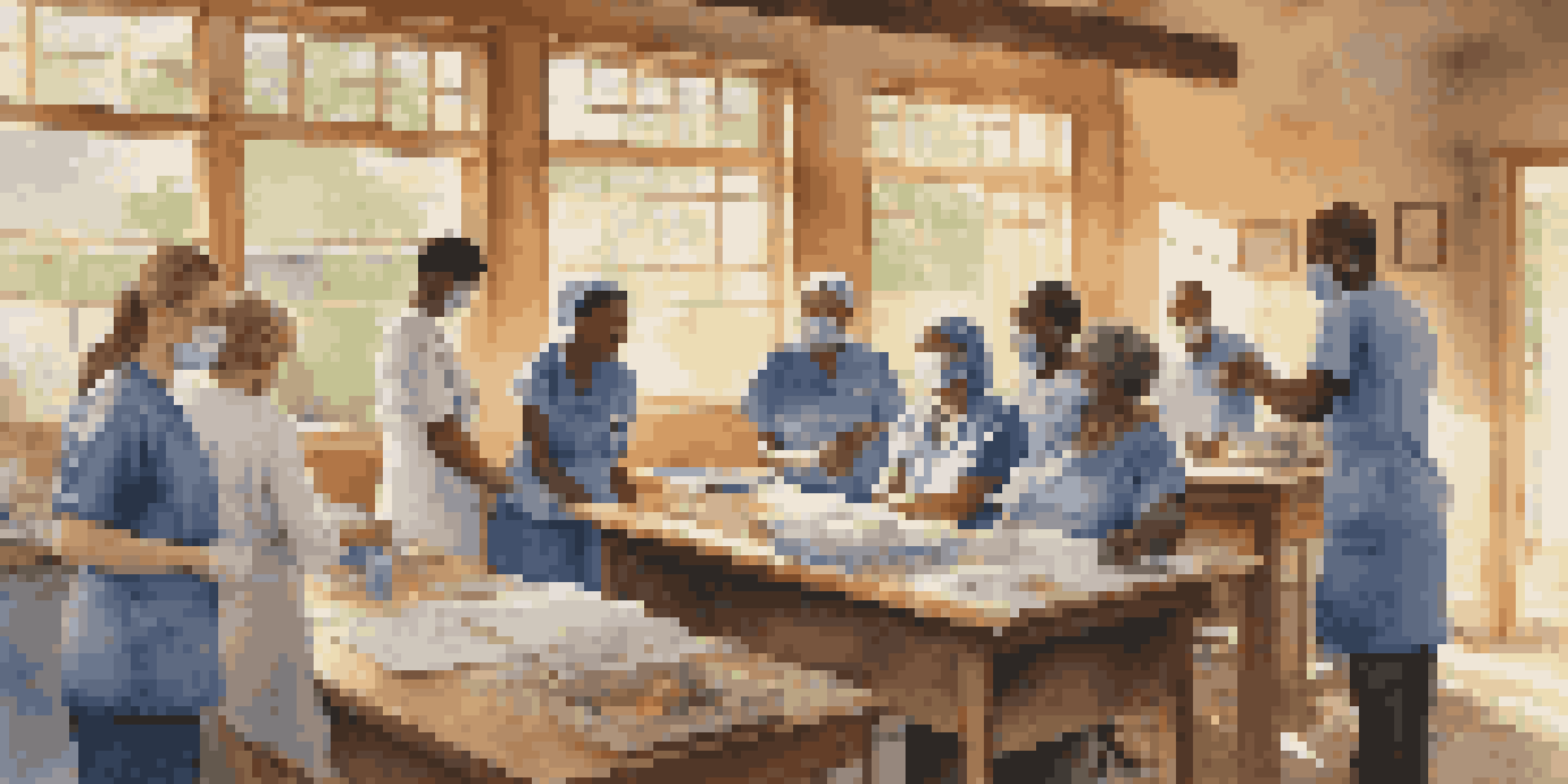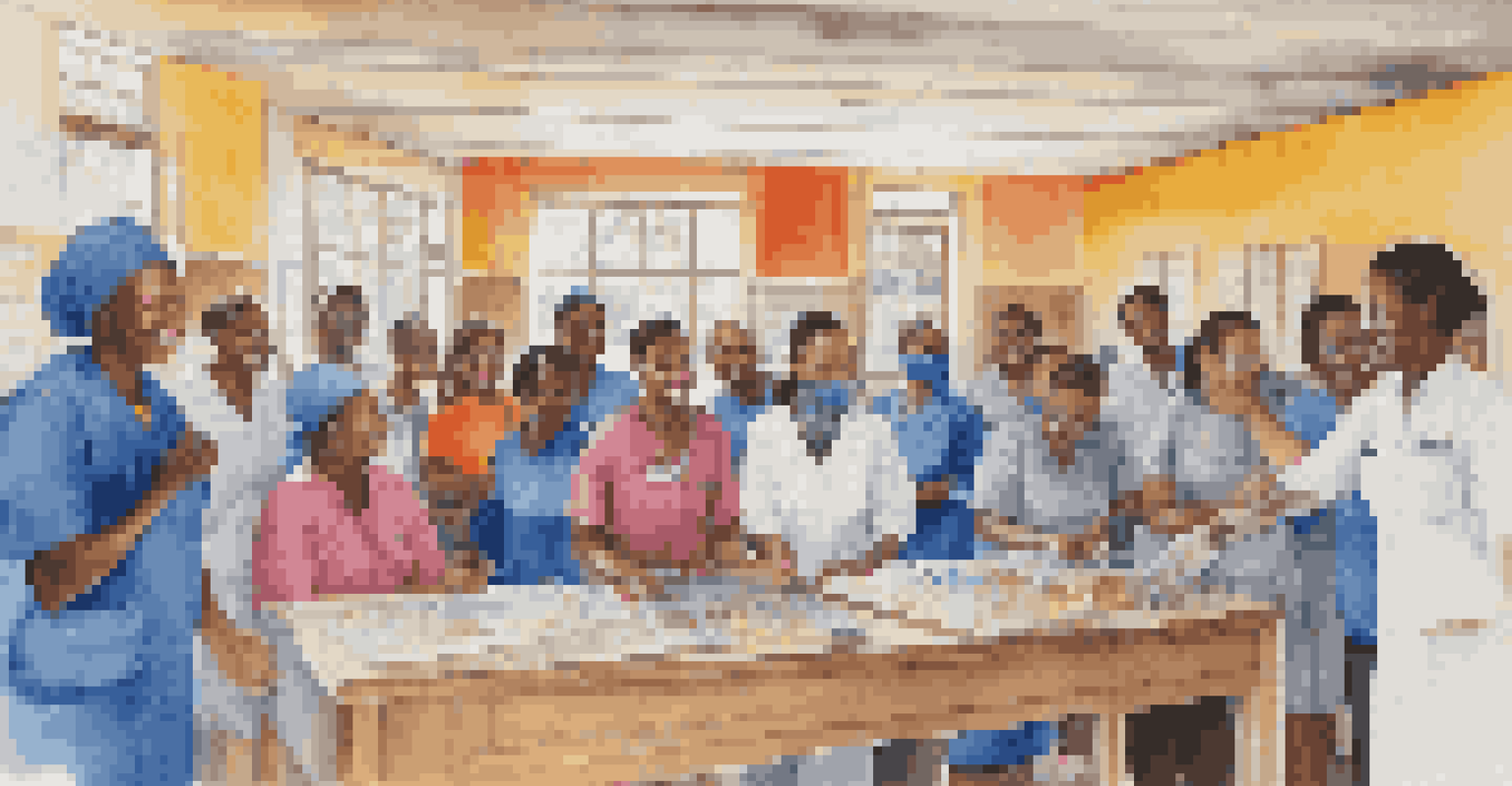Travel for Health: Volunteering in Medical Missions

Understanding Medical Missions and Their Impact
Medical missions are initiatives where healthcare professionals provide essential services in underserved communities. These missions often focus on areas with limited access to healthcare resources, making a significant difference in local populations. By volunteering, healthcare workers not only share their skills but also learn about diverse cultures and health challenges.
The best way to find yourself is to lose yourself in the service of others.
The impact of these missions can be profound, often drastically improving community health outcomes. For example, a simple dental clinic can prevent long-term health issues for children who may not have seen a dentist before. Additionally, these missions foster a sense of global citizenship, encouraging volunteers to continue advocating for health equity.
In essence, medical missions are about more than just providing treatment; they promote education, prevention, and long-term health improvements. Volunteers become part of a larger narrative, connecting their care with the stories of the people they help. This reciprocal relationship enriches both the volunteers and the communities they serve.
Why Travel for Health? The Benefits of Volunteering
Traveling for health through volunteering offers unique personal and professional benefits. Volunteers often return home with a renewed sense of purpose and a deeper understanding of global health issues. This experience can enhance their skills, making them more effective in their professions while also providing them with a fresh perspective.

Additionally, immersing oneself in a different culture fosters empathy and adaptability, key traits for any healthcare professional. For instance, a nurse working in a rural clinic might learn innovative ways to manage limited resources, skills that can be applied back home. These lessons, rooted in real-world experience, can be invaluable.
Medical Missions Transform Communities
These initiatives provide essential healthcare services and significantly improve health outcomes in underserved areas.
The camaraderie formed among volunteers also adds to the experience. Sharing challenges and triumphs with like-minded individuals creates lasting friendships and networks, enriching both personal and professional lives. Ultimately, the journey becomes a transformative experience, benefiting not just those served but the volunteers themselves.
Preparing for a Medical Mission: What You Need to Know
Preparation is key to a successful medical mission. Volunteers should start by researching the specific needs of the community they will be serving, as well as the logistical aspects of the trip. This includes understanding local healthcare practices and potential cultural sensitivities, which can greatly affect how care is received.
Volunteering is at the very core of being a human. No one has made it through life without someone else’s help.
Additionally, volunteers may need to gather specific supplies or medications that are in short supply in the destination country. Creating a comprehensive checklist ensures that nothing essential is overlooked. It's also wise to consult with experienced volunteers who can provide insights on what to expect.
Lastly, mental preparation is equally important. Volunteer work can be emotionally taxing, as you may encounter challenging situations. Being mentally ready to adapt and cope with these experiences will enhance your ability to provide compassionate care. This preparation not only sets the stage for personal growth but also maximizes the positive impact on the community.
Finding the Right Organization for Your Mission
Choosing the right organization to volunteer with can significantly affect your experience. Start by researching various organizations that align with your skills and values. Look for those that have a strong track record and positive reviews from previous volunteers, which can often be found on their websites or social media pages.
Consider the type of work you want to do, whether it’s direct patient care, education, or administrative support. Some organizations focus on specific areas of healthcare, such as maternal health or infectious diseases, so find one that matches your interests and expertise. This alignment can make your experience more fulfilling.
Volunteering Enhances Personal Growth
Participants return with renewed purpose and a deeper understanding of global health issues, fostering empathy and adaptability.
Finally, ensure that the organization prioritizes ethical practices and sustainability. Missions should empower communities rather than create dependency, so look for organizations that engage locals and work toward long-term solutions. A well-chosen organization will enhance your volunteering experience and contribute effectively to the community.
Cultural Sensitivity: Bridging Differences in Healthcare
Cultural sensitivity is crucial in healthcare, especially in a volunteering context. Understanding and respecting the cultural beliefs and practices of the community you are serving can significantly enhance the effectiveness of your care. This includes being aware of local customs, communication styles, and health perceptions that may differ from your own.
For example, some cultures may have traditional healing practices that are deeply ingrained in their healthcare approach. Acknowledging and integrating these practices can build trust and rapport, leading to better health outcomes. Volunteers should approach cultural differences with an open mind and willingness to learn.
Ultimately, cultural sensitivity not only improves patient care but also enriches the volunteer's experience. It fosters mutual respect and understanding, creating a more collaborative environment. As a volunteer, this approach allows you to connect on a deeper level with those you serve, turning a simple mission into a meaningful exchange.
The Emotional Journey of Volunteering in Medical Missions
Volunteering in medical missions can be an emotional rollercoaster. Volunteers often encounter heart-wrenching situations that challenge their perspectives on healthcare and life. These experiences can lead to a profound sense of empathy, as well as the realization of the disparities that exist in global health.
At the same time, the joy of making a difference can be incredibly rewarding. Witnessing a child's smile after receiving care or helping a family access essential services brings a sense of fulfillment that few other experiences can match. These moments create lasting memories and motivate volunteers to continue their advocacy for health equity.
Cultural Sensitivity is Essential
Understanding local customs and practices enhances care effectiveness and builds trust between volunteers and the communities they serve.
However, it's essential to acknowledge the emotional challenges that come with such work. Volunteers should seek support from their peers and engage in self-care practices to process their experiences. By doing so, they can maintain their passion for helping others while ensuring their own well-being.
The Lasting Impact of Medical Missions on Communities
The impact of medical missions extends far beyond the immediate health services provided. These initiatives often leave a lasting legacy in the communities they serve. Volunteer efforts can lead to improved health infrastructure, increased awareness of health issues, and education for local healthcare workers.
For example, training local health workers not only improves immediate care but also builds capacity for future health challenges. When volunteers share their knowledge and skills, they empower communities to take charge of their health. This creates a ripple effect, as better health practices are adopted and shared among community members.

Moreover, the relationships formed between volunteers and locals can foster long-term partnerships that continue to benefit the community. These connections often inspire ongoing efforts to address health disparities, ensuring that the mission's impact endures well after the volunteers have returned home. In this way, medical missions become catalysts for sustainable change.